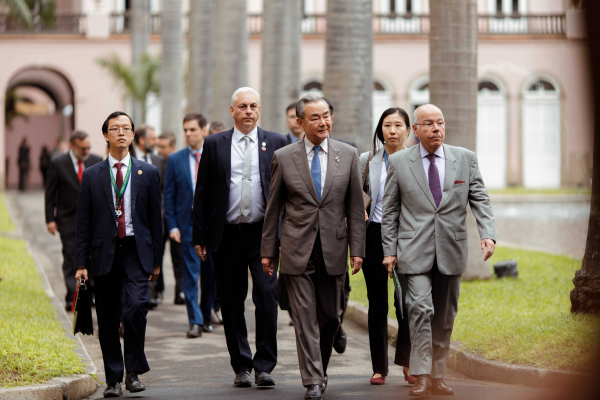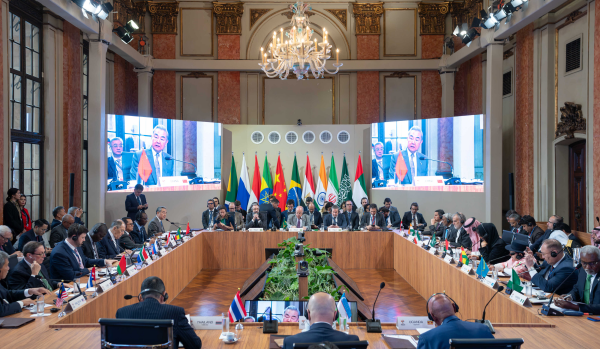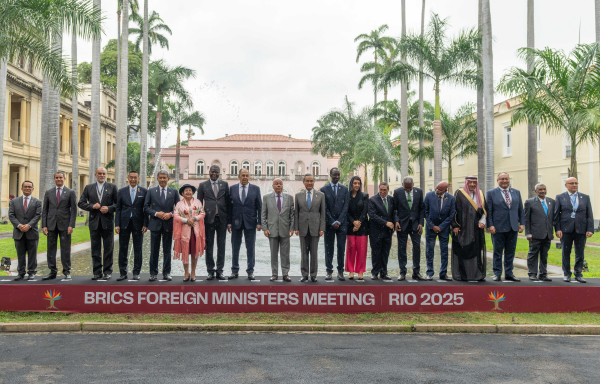
People’s Republic of China


On April 29, 2025 local time, the session for Ministers of Foreign Affairs / International Relations from BRICS members and partner countries was held in Rio de Janeiro. Member of the Political Bureau of the CPC Central Committee and Foreign Minister Wang Yi attended the session. The session was chaired by Brazilian Foreign Minister Mauro Vieira. Foreign ministers and senior representatives from 19 countries discussed ways to strengthen cooperation in the Global South and uphold multilateralism.
Wang Yi said that 11 years ago, President Xi Jinping proposed the BRICS spirit of openness, inclusiveness, and win-win cooperation, which provided clear direction for the development and growth of the BRICS mechanism. One day ago, President Xi Jinping made a special visit to the headquarters of the New Development Bank (NDB) of BRICS and sent a strong signal of China's firm support for the NDB. He expected that the NDB and the BRICS family will work together on the path of modernization. It has been observed that along the way, the BRICS countries have seen more and more partners joining, and the path of cooperation has become even wider. Today, the BRICS family, with a total population of over half of the world's population and an economic output accounting for nearly 30 percent of the global total, has stood at the forefront of the Global South.
Wang Yi stressed that faced with hegemonism, BRICS countries must uphold principles and serve as the main force in defending fairness and justice. In the face of unilateralism, BRICS countries must stand at the forefront and be the "backbone" in promoting solidarity and cooperation. The greater BRICS should shoulder the responsibility of the times, and work together with the Global South to uphold and practice multilateralism, and promote the building of a community with a shared future for mankind.

First, defend the core position of the United Nations. As the core of the multilateral system, the authority of the United Nations must be strengthened, not weakened. The greater BRICS should continue to advocate for extensive consultation, joint contribution and shared benefits, jointly resist all retrogressive acts in the world, safeguard the fundamental norms of international relations, defend the multilateral trading system, advance the reform of international institutions, and build a more just and equitable global governance system.
Second, promote the peaceful settlement of disputes. BRICS countries must uphold the vision of common, comprehensive, cooperative and sustainable security, and resolve disputes and differences through peaceful means. China is ready to work with the international community, especially other BRICS countries, to gather international consensus on the political settlement of the Ukraine crisis and continue to play a constructive role in achieving real peace. BRICS countries support the Gaza recovery and reconstruction plan recognized by Arab and Islamic countries, and firmly support the principle of "Palestinians governing Palestine". The international community should exert greater efforts in supporting the establishment of an independent State of Palestine.
Third, foster an open and cooperative international environment. In response to the United States' arbitrary imposition of tariffs and the global trade wars it has instigated, China's answer is clear, and China's position is also steadfast: if the United States insists on a trade war, China will fight to the end; if the United States wants to talk, the talk must be based on equality and respect. What China focuses on is not only its own legitimate rights but also the common interests of all countries; what China upholds is not only mutually beneficial cooperation but also international rules; what China resolutely defends is not merely national dignity, but also a just and fair world for all humanity.
Wang Yi stated that BRICS members should keep their doors wide open and embrace partner countries to help them deeply integrate into BRICS and fully participate in cooperation, so as to ensure the vibrant development of the mechanism. Continuous efforts should be made to expand the "BRICS Plus" model and bring together more like-minded countries to pool forces for peace and development. China will actively implement the concept of "high-quality development of greater BRICS cooperation" and the vision of building a BRICS committed to peace, innovation, green development, justice and closer people-to-people exchanges proposed by President Xi Jinping and support Brazil in fulfilling its responsibilities as the chair, jointly opening up a bright prospect for BRICS cooperation.
The attending foreign ministers said that in the face of escalating geopolitical tensions and the rise of protectionism, the urgent task is to uphold multilateralism, adhere to the purposes and principles of the United Nations Charter, and maintain the central role of the United Nations in the international system. BRICS countries should focus on peaceful coexistence, openness and inclusiveness, as well as dialogue and cooperation, oppose political polarization narratives, jointly defend the rules of free trade and the multilateral trading system with the World Trade Organization (WTO) at its core, and work for a more just and sustainable multipolar order. The attending foreign ministers expressed widespread concern about the adoption of "reciprocal tariffs" that disrupts global supply chains and exacerbates international uncertainty, calling for the cancellation of unilateral coercive measures such as economic sanctions and secondary sanctions that violate WTO rules and international law.




